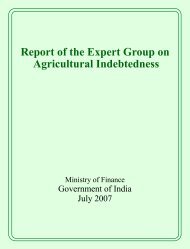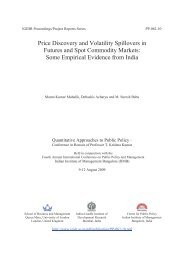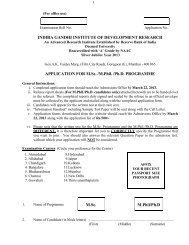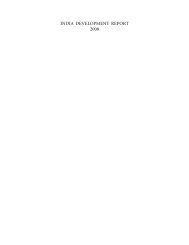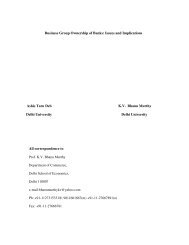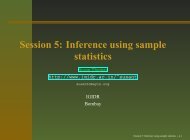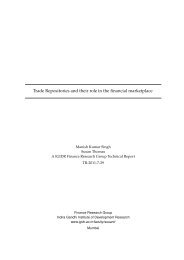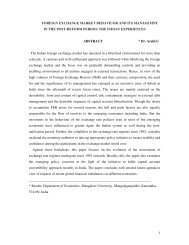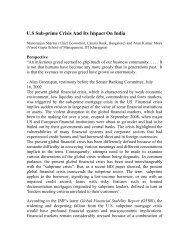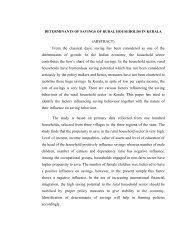National Human Development Report: 2001 - Indira Gandhi Institute ...
National Human Development Report: 2001 - Indira Gandhi Institute ...
National Human Development Report: 2001 - Indira Gandhi Institute ...
- No tags were found...
You also want an ePaper? Increase the reach of your titles
YUMPU automatically turns print PDFs into web optimized ePapers that Google loves.
122GOVERNANCE FOR HUMAN DEVELOPMENTNATIONAL HUMAN DEVELOPMENT REPORT <strong>2001</strong>governments and different politicalFiscal Responsibility Bill — 2000-01parties forming governments in theStates and the Centre — theThe Central Government has introduced the Fiscal Responsibility Bill in theworking together of such institutionsParliament in the Winter Session in 2000. It is, presently, under examinationconcurrently and in consonancebefore it is taken up in the Parliament for enactment. Though Article 292 of thewith each other cannot be taken forConstitution already provides for fiscal austerity, an explicit legislation is,granted any more. For instance, theperhaps, necessary in an era of coalition politics. The key features of the Bill are:tenure of the Thirteenth Lok Sabha,• The fiscal deficit, defined as the excess of total expenditure — includinghence the Government, the Tenthloans, net of repayments — over revenue receipts plus certain non-debtFive Year Plan of the country andcapital receipts, to be 2 per cent of the GDP by 2006 from 5.1 per cent of GDPthe term of the award of Eleventhbudgeted for 2000-01;Finance Commission are only• The revenue deficit, defined as the difference between revenue receipts andloosely overlapping. Institutionalrevenue expenditure, to be zero by 2006 from 3.6 per cent of GDP budgetedchanges have to be, therefore,for 2000-01;thought of to allow continuity and• Total internal and external liabilities at 50 per cent of GDP by 2011 from theharmony in the working of thesepresent level of about 56 per cent of GDP;bodies. Similarly, there are good• Prohibition of borrowings by Central Government from Reserve Bank of Indiareasons to devise new instruments(RBI) after 2004, except under special well-defined circumstances; andthat ensure continuity of basic• Expenditure cuts, whenever there is a shortfall of revenues vis-à-vis thepolicies on which there is consensusbudgeted expenditure;across political parties. Animportant example, in this context,is the Bill on Fiscal Responsibility that binds the Government of the day tofollow the accepted principles on fiscal consolidation. It has already beenintroduced by the Central Government in the Parliament, and there aregood reasons for similar bills to be introduced in the State legislaturesCorruption is the most endemic and entrenched manifestation of poorgovernance in the Indian society, so much so that it has almost become anaccepted reality and a way of life. Klitgaard has reduced the underpinningsthis social phenomenon, which afflicts most developing societies as well asthe developed ones, into a formulation that equates corruption withmonopoly power plus discretion minus accountability and low governmentsalaries. In other words, it suggests that when a relatively low paidGovernment servant enters a situation where he enjoys both monopoly anddiscretionary power without any or limited accountability, he/she has anincentive to restrict his/her assigned functions and duties, in the process,seek and charge a monopoly price for services rendered.There are many public activities, given that the country till veryrecently has had an administered and a regulated economy, where institutionalarrangements are such that state officials have monopoly, as well as,discretionary powers vested in them. This includes a range of activitiesinvolving interface with state utilities; state agencies responsible for licensing,including motor vehicle licenses, passports, trade licenses; and tenderingof publicly instituted works. The problem is compounded by procedural andlegal hurdles that an individual has to confront in almost every interfacewith the public authorities.CorruptionThe solution to the problem ofcorruption has to be more systemicCorruption= Monopoly + Discretion –PowerAccountability +Low Govt. SalariesSource Klitgaard 1998, Controlling Corruption; Berkeley, University of California Press.than any other issue of governance.Merely shrinking the economic roleof the state by resorting to deregulation,liberalisation and privati-



